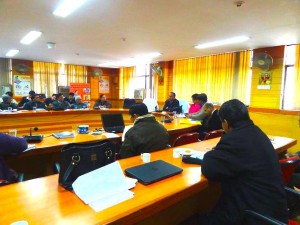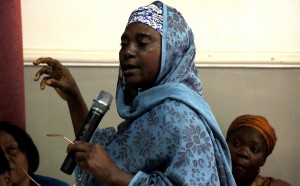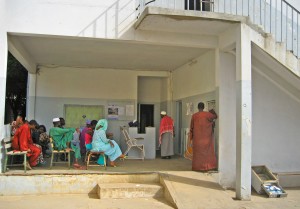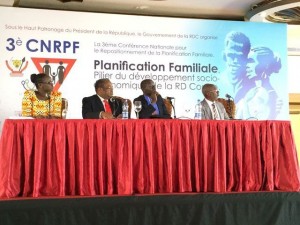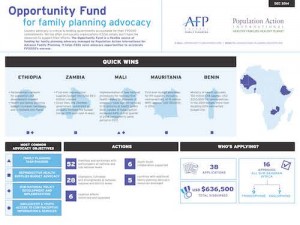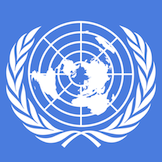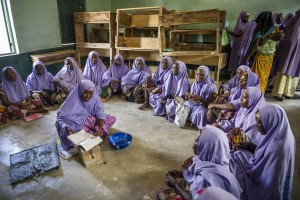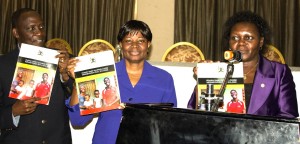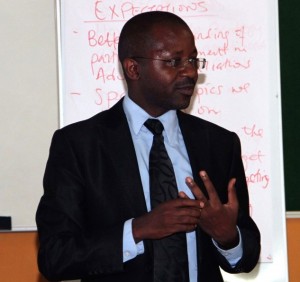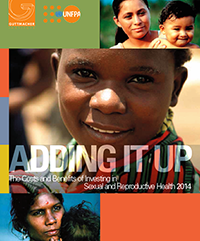View the latest family planning advocacy news from our partners.
By Mervyn Christian, AFP Program Officer, and Monica Wahengbam, AFP Program Coordinator, India
Last month, Advance Family Planning partner Population Foundation of India (PFI) organized and facilitated an orientation for program managers and directors of Uttar Pradesh’s 18 divisions on conducting a family planning program review. The orientation was the first step in launching quarterly review meetings aimed at strengthening the state’s family planning program; the first round of meetings are scheduled to take place this month.
The Accelerating Contraceptive Choice (Nigeria ACC) meeting in Abuja last month resulted in the development of actionable, evidence-based advocacy strategies for family planning to be implemented at subnational levels in Nigeria.
Mayor Amadou Diarra signed a commitment letter on January 5th, 2015 to invest 10 million FCFA (US $18,305) of the 2015 budget (a total of US $1,482,500) to purchase family planning products for the two health posts in the North Pikine commune of Senegal. AFP and Futures Group collaborated with Réseau Siggil Jigéen (RSJ) to achieve this Quick Win – a discrete funding increase or policy advancement.
By Harshi Hettige, Communications Specialist
January 29, 2015
Launching Family Planning Implementation at the Provincial Level
Originally posted on ALL ACCESS by Wendy Turnbull, Senior Advisor for International Advocacy, Population Action International
January 28, 2015
Commitments may get headlines, but advocates get results.
UPDATE (January 5, 2015): United Nations Secretary-General Ban Ki-moon has released the final synthesis report “The Road to Dignity by 2030: Ending Poverty, Transforming All Lives and Protecting the Planet.” Although it fails to refer to family planning, it does address sexual and reproductive health and reproductive rights. Paragraph 70 of the final report states:
On November 7, 2014, the Ministry of Health of Burkina Faso signed an important memorandum of understanding (MOU) with Advance Family Planning partner Equilibres & Population (EquiPop) authorizing a task-sharing pilot project for family planning services.
By: Harshi Hettige, AFP
Advance Family Planning (AFP) has partnered with two organizations; Pathfinder Nigeria and Planned Parenthood Federation of Nigeria (PPFN), to expand contraceptive method mix through evidence-based advocacy at the sub-national level.
On November 27, 2014 the Government of Uganda launched a costed implementation plan to scale up family planning programming and investments from 2015 to 2020. The plan serves as a roadmap to achieve the country’s vison for universal access to family planning and for middle-income country status by 2020. Hon. Sarah Opendi, Minister of State for Health, represented the Ugandan Prime Minister at the launch, and announced, “We have been crawling, we have hopped, and now we can run.”
By Dilly Severin, Communications Director, Population Action International (PAI)
In Burkina Faso, in October 2014, sixteen mayors have committed to include family planning in their respective communal development plans. The plans are currently being developed and will be validated by the end of December 2014 and will cover a period of five years. Moreover, the Mayor of Kindi committed to allocating 250,000 FCFA ($487.00 USD) to contribute to the delivery of family planning services in the health centers in his commune (see attached documents in French and English).
Spending $25 per Woman Each Year Would Dramatically Reduce Maternal and Newborn Deaths


